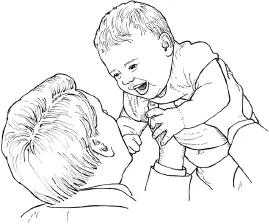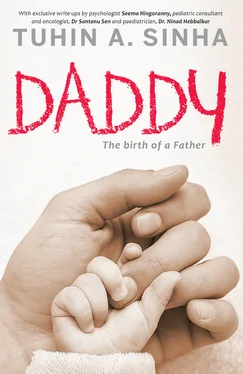Debendranath Tagore & Rabindranath Tagore
The seeds of Rabindranath Tagore’s spiritual journey were sown way before he was born. Much of his philosophical bent, which is celebrated worldwide through his poems and prose, came to him as inheritance from his father Debendranath Tagore. Debendranath belonged to an affluent family, but he believed that meditation, prayers and travel accelerated brain development better than knowledge from books. He belonged to the intelligentsia of his days which took great pride in its philosophical leanings. Santiniketan was in fact Debendranath’s discovery and not Rabindranath Tagore’s, as some might believe. Rabindranath further developed his father’s discovery and got it its due recognition.
As I flip through the pages of Tagore’s autobiography Jiban Smriti , it tells me that if the father connects with his son at a spiritual level, he often creates a legacy which is far greater than material inheritances.
Ramesh Tendulkar & Sachin Tendulkar
Ramesh Tendulkar, a respected Marathi novelist, was professionally poles apart from his sportsman son Sachin Tendulkar. However, both the Tendulkars shared a common goal of excellence and hard-earned self-respect. In his book, The Tendulkar Opus , Sachin says, “My father understood exactly how to get the best out of me. He always encouraged me and told my mother that he had full faith in me. It was probably reverse psychology, but as I got older I felt like I could not misuse that trust. He warned me against taking short cuts and told me to just keep playing, despite the ups and downs. My parents taught me that it is important to live every day of your life with grace and honour. When it came to choosing between cricket and going to university, he said, ‘You can play cricket, I know that is your first love, so go for it’.”
It might not have been easy for an educationist to watch his son put sport over academics, which makes it admirable that he blessed Sachin with his support. Sachin’s achievements are known world over and do not need further mention. From their inspiring story I learnt that a father should be prepared to take risks for his son and back his talent, no matter how unconventional his choices may be.
Superstar Aamir Khan and his wife Kiran Rao had their first baby, Azad Rao Khan, through the In vitro fertilisation surrogacy technique. This is an expensive procedure and not every couple having trouble conceiving can afford it. Some, however, have had the good fortune of experiencing parenthood through IVF surrogacy but are too embarrassed to acknowledge it.
For a public figure like Aamir to make a candid and brave admission set a new precedent of sorts. By attaching his brand value to the procedure, he managed to remove the unpleasantness associated with something that is scientific and healthy. Later, fellow superstar Shah Rukh Khan too followed in his footsteps, using IVF surrogacy for the birth of his third child.
I credit Aamir and his family for making their new-born a torch-bearer for many such deliveries in the future. His brave move has created for Azad, a path of truth, courage and progression.
While these are fathers I look up to, there are umpteen examples of dads who have failed their children. They were either found wanting in fulfilling their responsibilities or were outright indifferent to their child’s upbringing. Ironically, Mahatma Gandhi, who is known as the Father of the Nation, wasn’t the best parent to his son Harilal. An article published in The Guardian in 2007 corroborates this. “Mahatma Gandhi once confessed that the greatest regret of his life was that there were two people he had not been able to convince. One was Mohammed Ali Jinnah and the other was his eldest son, Harilal Gandhi,” said the story.
Gandhi was only 18 when his first son was born. Six months after the birth of Harilal, he left his family in South Africa to train as a barrister in London. Harilal’s early years were marked with complete neglect by his father which reflected in his various complexes and rebellious nature. He spent his life fighting against all that his father stood for and died a pitiable death a few months after his assassination. Did Gandhi get carried away in his exaggerated sense of idealism, making Harilal a victim? Well, the answer to that question will always remain a subject of conjecture.
German leader Adolf Hitler too had a tempestuous relationship with his father Alois through his growing up years. It is widely believed that Hitler was so terrified of his abusive father that it led to a persecution complex. Sadly, Hitler’s flawed personality resulted in consequences and casualties that impacted an entire generation.
So I guess it’s safe to say that a dysfunctional father-son relationship can almost never produce healthy or positive personalities. This is where a spiritual connect between the father and son becomes all the more important. A positive father can help his child explore facets of his personality that he would have never imagined existed in him. An aloof one, on the other hand, can end up fuelling unhealthy complexes that inhibit growth and progress.

BECOMING DAD
Chapter 1
Introduction
Why I wrote this book
Once while travelling in a cab with my son Tanish, I observed that our driver kept peeking at us in the rear view mirror. He then began humming a lullaby in a local dialect of Uttar Pradesh to himself. The pain and emotion in his voice was palpable. He later confided that he was missing his son who he had left behind in Allahabad while he worked here in Mumbai. Every year he would take a month off from work to visit his family in Allahabad. That was all the time he could eke out to be with his son. Every time he went home, he saw his son had grown considerably from the last time they met. It saddened him that he had missed out on some of the most magical moments of his early life.
This incident got me thinking about the sacrifices fathers often have to make for their family. The watchmen in my Mumbai apartment had a similar story to tell. They too meet their family only once every year. The agony of being separated from your child is hard to deal with no matter what your economic or social status. Be it a soldier manning our country’s borders or an IT professional who has to spend months abroad on work, their suffering is the same. Often you read about successful actors and cricketers rueing about their nomadic lifestyle that denies them the simple pleasures of watching their kids grow. When I think of that cab driver or my watchman, I feel extremely fortunate that as a writer I had the chance to closely witness Tanish’s evolution.
Caring for a baby has always been considered the mother’s domain. In fact, all books on child-birth or raising a baby have been written from the mother’s perspective. Hence, they do a great job in defining her duties but often leave out the dad’s role. When I heard I was about to become a father, I found very little literature to guide me through this journey. In today’s era where traditional gender roles stand re-defined, a man is as involved in bringing a baby into the world.
Fatherhood, like almost everything else in today’s world, is complex and layered. For the older generations, the role of a dad primarily involved looking into the financial needs of the family. Dads of that generation often kept themselves detached from their kids, sometimes deliberately. There were occasional indulgences in the form of bedtime stories. But for the most part they believed that their task was to discipline the kids. Mothers, on the other hand, were affectionate and indulgent, making up for the father’s aloofness. Today, we see a role reversal of sorts, which is not unrelated to the larger change in gender equations. Interestingly, I now find that most dads tend to be more indulgent while it’s the mothers who are in the policing mode.
Читать дальше













